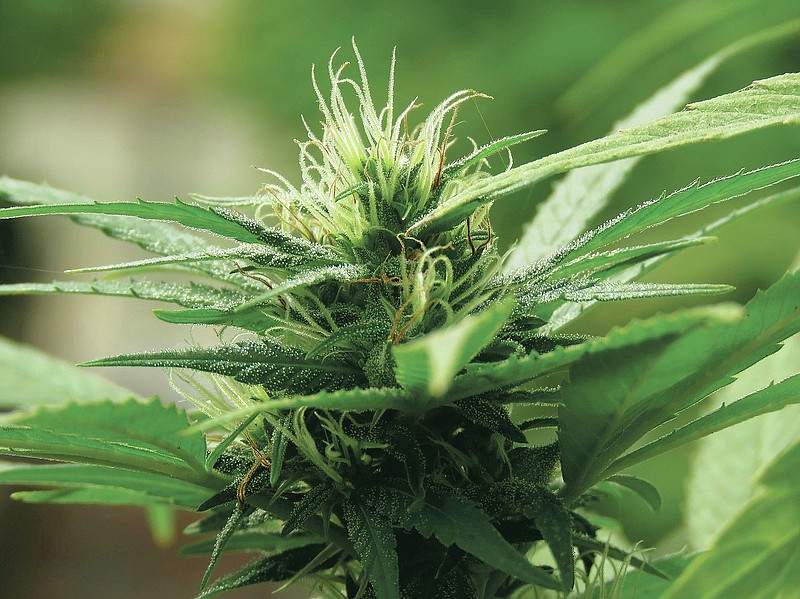PLEASANTON, Neb. -- When the Sweetwater Hemp Company's 16,000-square-foot hemp processing plant is operational in a few months, it will be the largest ice water extraction facility in the United States.
CEO Rory Cruise told the Kearney Hub the plant will run two extraction lines and can process fresh, frozen or dried buds. He added that most hemp processing plants use solvents such as carbon dioxide, ethanol or butane to extract the cannabinoids CBD or CBG.
"Covid has put me behind by about 3½ months," Cruise said, so the equipment made by Canada's Whistler Technologies -- north of Vancouver -- has not been delivered yet and processing likely won't begin until January.
There will be two 2,000-liter systems, which will allow identity-preserved batches based on CBD or CBG and different plant genetics and markets.
Cruise said the processing will start by mixing 133 pounds of buds with 600 pounds of ice and water that is kept right at freezing temperature.
The focus is on trichomes, the clear, sticky substance from resin glands on cannabis flowers (buds) that has CBD and the other cannabinoids. He said the ice and water keeps the trichomes and plant material from sticking together.
A sifter removes the biomass, which Cruise said can be used on fields like any other valuable organic matter, "like green manure."
What remains is "bubble hash," a mix of CBD trichomes and terpenes that give flowers and herbs their aroma and flavor. He explained that the bubble hash is melted down later in a "terp reactor" and mixed with coconut or golden hemp seed oil.
Cruise and Allan Jenkins of Kearney, a professor of economics at the University of Nebraska at Kearney who also is licensed as a 2020 hemp processor, said comments by Nebraska Attorney General Doug Peterson gives some processors cause for concern.
Jenkins described it as "a pretty significant curveball," which is why he didn't order processing equipment this year.
He said the attorney general's office has indicated that at no time during processing can the THC level exceed the 0.3% legal limit for hemp products.
Jenkins said that's "unavoidable because you're concentrating everything" while extracting CBD oil from the plant.
When asked by the Hub if Jenkins' summary about THC levels and CBD processing are a true representation of Peterson's statements, Suzanne Gage, director of communications for the Nebraska Attorney General, wrote, "Our office previously issued a memo specifically intended as guidance for law enforcement and county attorneys in response to a law change.
"There is currently a case pending before the Nebraska Supreme Court (State of Nebraska v. Deborah Archer, originating in Washington County) involving the legality of hemp products that could provide further guidance on these issues."
Jenkins called the 0.3% THC limit "a bright red line and you can't go over it," even though the raw product coming in and processed product sold are below the limit.
"If you read the law, it doesn't say that," Cruise said about never crossing the THC limit during processing. He agreed with Jenkins that concentration is involved any time one or two elements are extracted from a raw product, and used biofuels processing as a similar example.
Cruise said the THC level issue won't affect the Sweetwater Hemp process because freezing water will keep THC levels down and the CBD will be mixed with oils. "Our engineers are working on the process to be in compliance," he said.
Jenkins worries about how the U.S. Justice Department's Drug Enforcement Agency might interpret the rules. So despite being a longtime advocate for hemp, he said that until the issue is clarified, "I won't risk going to jail."
Meanwhile, Cruise continues to source 2020 hemp from other growers.
He has 900 plants in his family's Sprout House greenhouse southeast of Pleasanton and across the road from the processing plant, but estimates he'll need buds from 450 acres for year-round operations.
He's now working with eight to 10 growers. Cruise said that because of the delay in getting plant operations started, those farmers have been asked to dry their own hemp, bag it and deliver it to the plant.
Building construction started in May as part of an overall investment of about $3 million in a hemp growing, processing and marketing business. The contractor is Bel-Wood Buildings of Grand Island.
The overall plan is for another 2,000-liter processing unit to be added within six months to a year, Cruise said.
"Before covid hit, this facility was designed with a two-acre greenhouse ... to grow up to six types of cannabinoids," he added. "It's all designed and planned, but it's going to depend on if this (processing) part grows."
For now, he's planning to grow 900 plants again in 2021.
"I probably will change the genetics to learn more about hemp genetics," Cruise said.


Distributed by The Associated Press.
